LithuaniaLaw.com website helps to find answers to the common legal issues faced by foreigners in Lithuania.
Our legal services
Using our experience with foreigners and foreign companies we aim to provide a quality English-language introduction to Lithuanian laws.
Moreover, we offer our services:
*Private consultations on Lithuanian law.
*Establishing companies in Lithuania.
*Restoring Lithuanian nationality (including archive help).
*Litigation within Lithuania.
*Other legal procedures in Lithuanian institutions.
Team and contacts
Aistė Žemaitienė
E-mail: aiste.zemaitiene@gmail.com
Aistė Žemaitienė is a certified Lithuanian attorney, able to represent her clients in all the Lithuanian institutions and courts of law. She specializes in citizenship law, residence law, civil law, and business law. An excellent speaker of English, she has a mostly foreign clientele from more than 30 countries. She is a member of the Lithuanian Bar Association. She has volunteered in numerous expeditions researching Lithuanian heritage abroad for the Encyclopedia of Lithuanian heritage abroad, helping her understand better the Lithuanian diaspora and migrant needs.
Augustinas Žemaitis
Augustinas Žemaitis is the founder and author of the largest English website about Lithuanian history and culture, as well as the Encyclopedia of Lithuanian heritage abroad. Augustinas is a certified guide in Lithuania and a Lithuanian archive researcher who is able to help clients trace their Lithuanian family histories. Augustinas has a Lithuanian Law University degree and, as a lawyer, specializes in citizenship, residence, intellectual property, and other spheres of law that foreigners often encounter in Lithuania. An avid traveler, he has visited over 110 countries, which helps him to understand clients of every culture better.
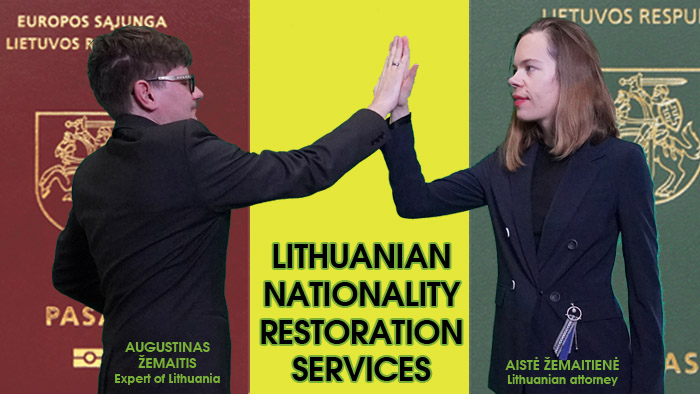

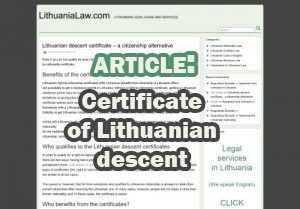
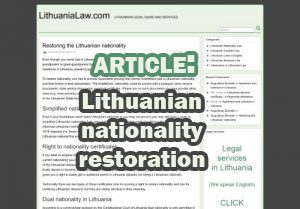
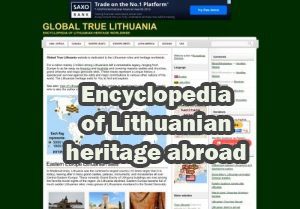

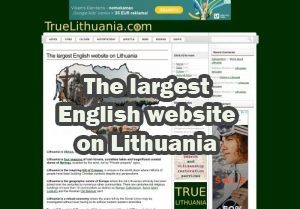


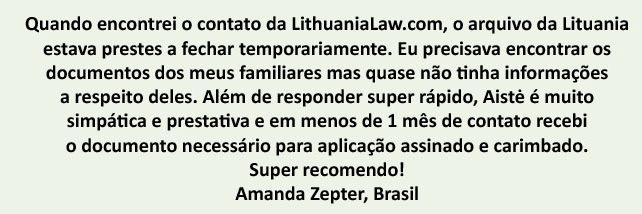
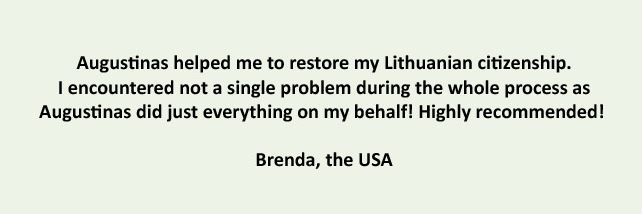
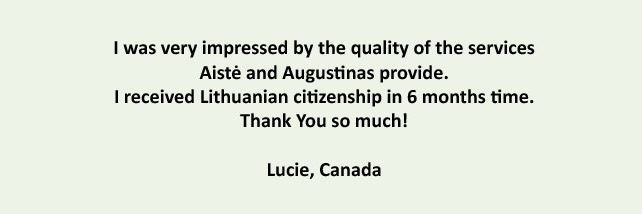
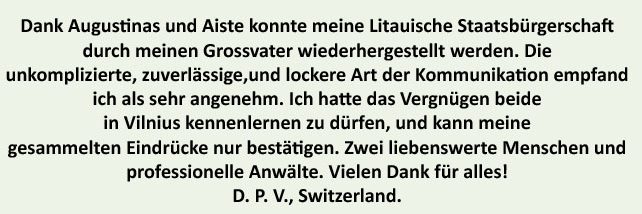
I’m sorry, I thought I was writing in an internal mail system. Can you please answer me privately through my mail and delete this comment?
thanks a lot,
Itay
I have replied you by e-mail and deleted the previous comment.
Regards,
Augustinas Žemaitis.
Legal advice should be sought from you
Hello, I have a question regarding if I am eligible for dual citizenship (American-Lithuanian). My great-grandparents, grandparents, parents, and myself were all born in Lithuania.
My parents took me to America in 1999 when I was 5 years old. My mom became an American citizen in 2008 when I was 15 years old. My father is still a Lithuanian citizen but a permanent resident of the U.S.
I gained American citizenship automatically because my mother gained hers but I am curious to see if I am eligible for dual citizenship or if I still have my Lithuanian citizenship
According to the current rules, dual citizenship is available to those who were born as Lithuanian citizens.
As I understand, you were born in 1994 and you were born as a citizen of Lithuania, as such, you would be eligible for dual citizenship.
It is difficult to say if you still have a Lithuanian citizenship. As, at one time, the laws did not allow dual citizenship for people like you, by law alone, you would have lost citizenship at the time (likely some time around 2011). Still, if nobody started that process, it is likely you still formally have the citizenship. We may check this or do the application necessary to return citizenship in case you don’t have it.
Dear sir
I am Zain from Syria, a university graduate. I am looking to issue a temporary residence permit for my children, and then permanent residence and nationality. What are the available solutions to do this, knowing that I do not need to go to Australia as a refugee, because sometimes I need to visit my homeland Syria because my father and mother are in Syria And they are old, looking for a better future for my family. You know the amount of devastation and destruction, whether in economic or psychological terms, here in Syria. I am 45 years old, my wife is 37 years, and I have children, the first is 17 years, the second is 15 years, the third is 12 years, and the fourth is 5 years old. They have a better future– —
Sent from Gmail Mobile
We are able to speak only about Lithuania and Lithuanian law. Lithuania is quite far from Syria and the immigration is limited here, it is not among the easiest places to get a nationality if you have no Lithuanian descent. If you seek a place closer to Syria, other Middle East countries may be desirable but you need to evaluate the legal situation in each of them. Not every country offers a path to citizenship for immigrants (e.g. it is difficult in the Gulf countries) and yet, however, citizenship is not necessarily needed for a good life there.
Good Afternoon,
I am doing an investigation of state immunity and I need some jurisprudence against Rusian Federation. Could you advice me in order to know where I can write to?
Thank you very much,
Cecilia.
Dear Cecilia,
Lithuania was occupied by the Soviet Union in 1940-1941 and 1944-1990 and the Soviet Union has perpetrated genocide, war crimes, expulsions on ethnic basis and other practices contravening international law. Russian Federation is the successor state of the Soviet Union.
So, after Lithuania achieved independence, Lithuanian courts have indeed received claims against the Russian Federation. However Russia invoked state immunity in them which the Lithuanian courts generally upheld (the claims are accepted for litigation, then Russia invokes state immunity and the cases are cancelled).
In case no. 2-265-109/2008 (appeal no. 2-331/2008) several Lithuanians sought 400 000 EUR compensation from Russia for forced expulsion, illegal arrest, etc. Russia invoked immunity. While the claimants said this is based on „acta jure gestionis“ and the immunity does not applies, the court judged it to be based on „acta jure imperii“ and upheld Russian immunity.
In case 2-1568-343/2009 (appeal no. 2-1469/2009) another similar claim (based on illegal arrest, imprisonment, forced labour, etc. imposed by Soviet officials) was also ceased as Russia invoked state immunity.
In general, Lithuania has moved the requests to compensate the damage done by Soviet occupation and genocide to the political international affairs level. Such compensations, if received, would be distributed to the victims. However, Russia refuses to compensate the damages in that way as well.
The pracitice has been somewhat different in civil cases. In case 3K-3-566/2003 Russia also attempted to invoke state immunity, however as the question was related to lease agreement for premises used by the Russian embassy court deemed it to be based on „acta jure gestionis“ and therefore acceptable for litigation despite the declaration of immunity.
In case 3K-7-179/2006 Lithuanian courts upheld a decision by London arbitrage that awarded money (unreturned debt and interest) from Kaliningrad Oblast to the claimants (a Cyprus company). However, the defendant was not the Russian Federation itself but rather the government of its administrative unit. Nevertheless, the defendent used some political arguements in the Supreme Court: „The [previous instance] court have not considered if such decision will not damage state interests and Lithuanian-Russian relations“.
Hi, my family was in Lithuania until early 30s they were Jewish. I am a citizen of US but would be interested in getting a Lithuanian citizenship, is that possible?
leo
ps feel free to email me
Yes, it should be possible, if the necessary things will be proven by documents (e.g. that you descend from this family and this family had citizenship). We will e-mail you with further questions.
Hello –
My grandfather was born in Lithuania in 1894. I have a handwritten birth certificate dated 1919, written by the pastor of a church in Radviliskis. He left Lithuania in 1914 and became a US citizen in 1926. I am interested in getting Lithuanian citizenship. Is this a possibility? I would welcome an email. Thank you.
~Maria
Yes, it is possible. However, dual citizenship is not certain, because it is not entirely guaranteed that your grandfather would be considered a Lithuanian citizen as he left in 1914 while Lithuania became independent only in 1918. However, there are legal possibilities to argue that he was a Lithuanian citizen.
A more certain path to citizenship is the simplified procedure for people of Lithuanian ancestry whose forefathers were never citizens of Lithuania. This path, however, does not offer dual citizenship.
Moreover, there are other possibilities even if the dual citizenship would be impossible and you would not want to renounce the current citizenship. The possibilities include an easier residence permit for people of Lithuanian ancestry, a certificate of Lithuanian descent which may later be converted into a citizenship, etc.
We will send our offers by e-mail.
Hello again Mr. Augustinas, I have one question and I would apreciate if you can help me: My grandmother was born in Latvia in 1915. Their parents were born in Druya (Disna) in 1887 and Bajoriskiu (1888). I have all birth certificates from the three archives: grandmother born 1915 from Latvian archives, great-grandfather born in Druya in 1887 from bielorrusian archives and great-grandmother birth certificate from lithuanian archives. Is my grandmother latvian, lithuanian or bielorussian? (they emigrated to Brazil in 1927) and according with departure and arrival certificates (issued in Germany and Brazil), all of them were lithuanians. We don’t have passports. Do you think that is possible to proof the lithuanian citizenship of my grandmother born in Latvia? Thank you and happy new year!!
There are two issues here. The first is the citizenship they held, the second is their ethnicity.
As for citizenship, they likely held the citizenship of the Russian Empire until the World War 1 (as Lithuania, Latvia and Belarus were all controlled by the Russian Empire at the time). There were few internal migration controls, therefore it was common to move accross Lithuanian/Latvian/Belarusian borders for better economic opportunities. Riga, for example, was a major industrial city of the region, attracting many ethnic Lithuanians and Belarusians as well. In fact, before World War 1 there were more ethnic Lithuanians in Riga than in any city within Lithuania. More info on the Lithuanian community in Latvia: http://global.truelithuania.com/latvia-291/ .
After World War 1, Lithuania and Latvia became independent and many of such temporary migrants moved back to their homelands. The number of ethnic Lithuanians in Latvia declined from 100 thousand to 30 thousand in 1918-1931, for example. Usually (though not always), people would get citizenship of the country they moved to. Therefore, an ethnic Lithuanian who remained in Latvia after 1918 would have likely adopted Latvian citizenship, while the one who moved to Lithuania would have adopted Lithuanian citizenship. If your forefathers had Lithuanian citizenship, you may restore it as dual citizenship (retaining your current citizenship). Citizenship could be proved by a search in Lithuanian archives for such information (not necessarily the passports, but other informaiton proving citizenship as well).
As for the ethnicity, it did not depend on citizenship. The ethnicity is sometimes recorded on the documents of the time, it may also be presumed based on names, surnames, religion, etc. If your forefathers were ethnic Lithuanians, you may get the Lithuanian citizenship (as a single citizenship), residence permit or certificate of descent. Lithuanian ethnicity would be easier to prove even without archive search for citizenship information.
While the arrival/departure certificates typically listed citizenship, they may also have listed ethnicity at times.
Personally, given the history, I believe your grandmother was an ethnic Lithuanian who lived in Latvia (where her parents likely worked just as many Lithuanians at the time before and during World War 1). It is likely that her family returned to Lithuania ~1918, thus receiving Lithuanian citizenship, before moving on to Brazil. However, that is what I can write from the information you provide and this is not 100% certain.
The town of Druja actually straddles Belarusian-Latvian border, with Belarusian side known as Druya and Latvian side as Piedruja. Understandably, there was no border before 1918 and thus it didn’t matter much on which side to live, but after 1918 it became important. Druja also had a large ethnic Lithuanian population before World War 1.
Wow! I didn’t read this before!! Thank you so much and regards.
Dear Marcelo,
I have a similar situation to yours. How did you find the archives for Druya? Thank you!
Hello Augustinas,
I can trace back my ancestry to 1700. Which documents would I need to obtain citizenship? Can you assist with tracing birth certificates etc.?
We may help in tracing documentary proofs necessary for obtaining citizenship. We may contact you with our offers.
Hi Augustinas,
Any tips for searching through Lithuanian archives? I am a Litvak and my ancestor came from a shtetl, and I am interested in restoring my citizenship.
Also, I have documents from the US stating that this ancestor’s citizenship was Lithuanian. Is this sufficient for proof of Lithuanian nationality? I still haven’t found any documents (yet!) in Lithuanian asserting his nationality.
Thanks
(that is a real email by the way!)
Hello!
To elaborate, one of the few documents I’m referring to is an original US naturalization certificate which states his former nationality as Lithuanian.
Do you think this could perhaps be sufficient proof or a good starting point?
Thanks again
It is a good starting point.
In general, each case is evaluated individually by the Migration Department, as each situation tends to be different (in terms of what exactly proofs are available). In borderline cases, it may even somewhat depend on the employee who evaluates the case.
That said, if this naturalization certificate is the sole proof of Lithuanian citizenship you have, it is unlikely this would be enough.
But, knowing the information you have from that document (and any information you heard from your parents/grandparents about the dates, names and locations), you may do an archive search. We may offer you services in that, as well as the application.
In general, the Lithuanian archives are not scanned nor available online, therefore it is, unfortunately, impossible to view the documents available there via the internet as scans.
Hi,
My grandfather is Kipras Petrauskas, the operatic tenor, you may know the statue of him in the park by the opera house in Vilnius. My mother, his oldest daughter was separated from him along with the rest of the family during the final Russian occupation.
I wish to restore mine and my children’s Lithuanian citizenship and will be visiting family in Vilnius in about two to three weeks time.
Can you let me know via email if you can assist me in this process and what costs would be involved.
Thank you for contacting us! Indeed, Kipras Petrauskas is well known in Lithuania, he also has a museum dedicated to him in Kaunas. We have e-mailed you our offer regarding citizenship restoration process and we hope you will have a nice time in Lithuania.
Hi Augustinas,
I was born in Vilnius in 1976 and we emigrated from Vilnius in 1983. My Grandfather and Grandmother were born in Lithuania in 1923 but on my Father’s birth certificate their Lithuanian names were changed to Russian versions (Lieb changed to Lev etc). When my father applied for citizenship in 2007 the authorities said there was no proof that Lieb was Lev and denied the application.
Do you know if this kind of problem would still occur after the 2016 changes?
Such evaluation often depends not on some regular practice but rather on a person who evaluates. Often, different employees of the Migration Department may come to different conclusions since it is subjective on when the name is close enough (there are no particular conditions in the citizenship law or any bylaws saying when the name should be considered close enough to consider somebody the same person).
Therefore, it is wise to apply for a citizenship again, which we may help you with.
Additionally, if the citizenship is not granted, it is always possible to appeal to a court. The court decisions may change the decision of Migration Department. Moreover, the courts are often deciding more liberally when a person could be considered the same person.
Even the 2016 citizenship law change itself was achieved indirectly through our court cases: that is, as we had many appeals in courts questioning whether the circumstances of a particular person’s emigration warrant a dual citizenship according to the pre-2016 law, the parliament decided to alter the law and drop the requirement of proving circumstances altogether.
Hello mr augustinas. How are you doing? Hope everything’s going well with you, mr augustinas I’ve sent you two emails about hopefully getting back the Lithuanian passport but you didn’t reply still. I just wondered have you received my emails sir ?
I have received the e-mails and now replied. As I was volunteering on the “Destination America” project to document the Lithuanian-American heritage, I was away to the USA and had limited access to my e-mail (see: http://global.truelithuania.com/destination-america/ for more about the project).
Hi,
My mother was born in Lithuania in June 1928. Her parents (my grandparents) were born in Lithuania in the early 20th century. My grandfather emigrated to the US in June 1928 and my mother and grandmother emigrated in July 1930. They left fearing persecution . Am I eligible for Lithuanian citizenship without renouncing my U.S. citizenship? Thank-you.
Yes, you should be eligible for dual citizenship, unless you would fall into one of the exceptions. The main questions are if the yhad Lithuanian citizenship (given the family history you wrote, that is extremely likely) and when they did naturalize in the USA?
There is no need to prove now that they left fearing persecution. That requirement was removed from the law. The only thing needed to prove now is that your forefathers (parents, grandparents, great-grandparents, or just a single one of them) had Lithuanian citizenship until 1940 (depending on year of naturalization, they could have retained Lithuanian citizenship even if naturalized in the USA).
We may offer archive search and citizenship application services if needed, as well as services in contacting the institutions and collecting the necessary info.
Hello,
I have read through the entire page to see if this was answered previously, but my case is somewhat different.
My great-grandparents left Lithuania for the US in 1904, but their parents and family stayed and became Lithuanian citizens in 1918. I have many of their documents, from baptism, marriage as well as their travel documents. My researcher has provided additional family documents.
I am interested if my case would be appropriate for dual citizenship, if their parents and family that stayed in Lithuania became citizens.
According to the laws, the fact that one’s great-great-grandparents were Lithuanian citizens does not directly entitle one to citizenship restoration.
However, there were clauses in the first interwar Lithuanian citizenship laws that defined who is to be considered a Lithuanian citizen that may have awarded citizenship to your great-grandparents as well. There are few legal precedents that explain these laws so far, however, and the laws were vague as was common in the 1918-1920s era when many new laws had to be written quickly.
Namely, the laws stated that the following people are to be considered citizens of Lithuania:
According to the Provisional law on citizenship (1919) the following people became Lithuanian citizens:
1.Those who live in Lithuania and whose parents and grandparents have always lived in Lithuania.
2.Children of the people specified in 1, who – even though did not always live in Lithuania – have came back to live there.
3.People who lived in Lithuania for at least 10 years before 1914 if they had either one of those: a)Personal real estate b)Permanent job
4.Children of a Lithuanian citizen
5.Wife or window of a Lithuanian citizen.
6.Children of an unmarried female Lithuanian Citizen if they are not recognized by a foreigner as his children.
7.Foreigners who have been naturalized as Lithuanian citizens (naturalization was possible for those who continuously lived in Lithuania for 5 years, has a job that provides him and his family income and has not been sentenced to prison or worse).
Some other additions to Lithuanian citizens have been made through International agreements and events, e.g. peace treaty with Russia or the joining of Klaipėda Region to Lithuania.
In your case, it may be argued, that clause (4) should apply to your great-grandparents and, depending on the situation, clause (3).
Additionally, you may claim Lithuanian citizenship through ancestry claiming that your grandparent was a Lithuanian. This could lead only to a single citizenship or residence permit, however.
Hello,
I wonder if I can ask for a Lithuanian refund?
My grandfather Juozas Malisauskas was born in 1913 in Lithuania to Lytaus, and left the country at the age of 14 to live in Brazil in 1927 along with my great-grandparents Petronele Malisauskas and Star Malisauskas.
I have his documents in Brazil: marriage certificate, Brazilian immigrant work book. But I do not have any data to prove that you are living in Lithuania.
Thanks in advance.
Unfortunately, I don’t fully understand what you mean. If by “refund” you mean “restoration of citizenship”, then yes – if your grandfather was a citizen who left to Brazil, you in most cases can restore Lithuanian citizenship. By “you are living in Lithuania” did you mean that “he was living in Lithuania”? If so, such documents may be acquired in Lithuanian archives, if they exist there, and we may offer archive search services.
Hello,
My grandfather was born in Lithuania in 1909 and emigrated to South Africa in 1928. I have documents showing his loss of Lithuanian citizenship in 1938 on becoming South African. I understand that because this took place before 1940, it is not sufficient to obtain dual citizenship. I have two questions:
1) Would it be possible to claim dual citizenship through my grandfather’s mother, who remained in Lithuania until her death in 1941?
2) In your opinion, is the nationalisation law likely to change in future to allow dual citizenship in such cases?
Many thanks in advance for your advice.
The case is in “grey area” for now. It is not yet established by a court precedent whether grandfather’s mother would be enough in such a case (as she did not leave Lithuania herself but her son did). Also, the practice of the meaning of what it meant to no longer be a citizen by 1940 seems to be interpreted differently by the different employees of the Migration Department, with some employees considering only the people who denounced the citizenship themselves (in front of a Lithuanian consul) as having lost it (e.g. ones who denounced citizenship so they would not need to serve in the Lithuanian army).
In my opinion, the court precedents will further establish the precedents and it will become easier to guess the results of applications in advance in such cases (they will less depend on the particular employee, as each government employee has to follow court precedents but they are not obliged to follow the precedents set by other employees, which are not public). Therefore, you may have chances but they are not 100%.
The law is rather unlikely to expand the dual citizenship, however, as it is limited by the constitution and the change in that part of the constitution is extremely difficult. There will be a referendum on its expansion this year, however. Yet, Lithuania has some of the tightest referendum laws in the democratic world, making any proposition extremely difficult to pass even if the majority of voters support it.
I study in Lithuania where i got my master degree in Business economics but i left lithuania because of money to follow my education and i ce to Germany to look for job and i make a mistake by sign asylum in Germany and i would like to come back and follow my education and have a job in Lithuania but my visa is finished. In asylum process it is possible to ask a visa in Lithuania ambassy in berlin or in France ??
It is possible to have a lawyer, who can fight for me to come back in Lithuania continue my study in order to no be deported.
I am interested in applying for a Lithuanian passport for my wife and 4 daughters (ages 23, 21, 19, 14). They all have South African passports.
Background:
My wife’s grandparents (on her father’s side) was born in Lithuania and moved to South Africa before World War 2. Her grandfather was however naturalized in 1935 – I have been told that there is now a possible problem with this date based on a new law in Lithuania.Is this the case?
I don’t have the grandfather’s Lithuanian documents but I have his original South African naturalization certificate showing his place of birth. I also have the grandmothers original Lithuania passport but the names in the passport are different as she change her name when she arrived in South Africa. I also have my wife’s father’s South African birth certificate which shows his parents were born in Lithuania. Can any of these documents be used to get dual citizenship for my family.
Please can you give me a full breakdown of what your typical fee for this service is.
We will send you our offer by e-mail.
Indeed, according to the current interpretation (2019 April) the person should have been a citizen of Lithuania until 1940 (the occupation of Lithuania). Naturalization in countries other than those of the American continent often led to a loss of Lithuanian citizenship. That said, according to the current practice, it is often so that only the cases where there is direct evidence of a person renouncing citizenship (e.g. claiming that he is not a citizen when drafted to the Lithuanian military) is treated as proof enough to show that the person has lost citizenship.
That said, you would need documents beyond naturalization certificate to prove that your wife’s grandparents were citizens. A Lithuanian archive search would be needed for Lithuanian documents. Should nothing turn up, a court case to establish the fact of the wife’s grandparents’ citizenship would be needed.
Hi,
Please can you help with legal service for rental of Apartment in Vilnius?
Thanls
Yes, we offer such services. You may contact by e-mail asking personally what you need and we would send you the prices for such services.
Dear Mr. Zemaitis,
I am in the U.S. and am writing on behalf of my son. He would like to establish citizenship or Permanent Residency in Lithuania. His great-grandfather Morris (Jewish) was born near Vilna, where his father was a physician. Morris emigrated to the U.S. in 1905 to avoid conscription in the Russian army. He lived the rest of his life in the U.S. and became a dentist.
I have copies of two family memoirs which mention that Morris lived near Vilna. I am a researcher by profession and can do research that might be necessary in the U.S. if that would be desirable.
My son, Zachary, teaches English as a Second Language and has a U.S. university diploma and CELTA certificate. He has an American passport. He currently lives and works in Western Asia. He would ultimately like Lithuanian citizenship but wants to also keep his American citizenship. Possibly, a certificate of Lithuanian descent would allow him and his wife to obtain Permanent Residency and, later, citizenship.
While Zachary is intent on living in Lithuania, I am writing on his behalf because I have more time and money than he does.
Can you help with this?
Thank you in advance. And, also, thank you for the wonderful work that you are doing to preserve Lithuanian heritage sites in the U.S.
Warm regards,
Alexandra
We may be able to help with this; however, as Morris emigrated in 1905, the situation is rather difficult as it was still more than a decade before independence and the time Lithuanian citizenship was instated. For Zachary to become a dual Lithuanian citizen, Morris should have been a Lithuanian citizen and while this is possible (either he applied for citizenship or, as this was rather unlikely back then, he was automatically considered a citizen because of real estate ownership or job prior to emigration), far from everybody who left in 1905 became considered a Lithuanian citizen or there is remaining data in the archive to prove it. We will contact you with an offer, first just for archive search – even if there would turn out that there is not enough data to prove what is necessary in the archives, you could still learn some more about the family history.
Dear Mr. Zemaitis,
I have written earlier about obtaining a Lithuanian Certificate of Descent because my grandmother and both great-grandparents were from the Kovno area, before they emigrated to the USA in 1900.
However, I have since learned my great-grandfather, Antanas, did not naturalize in the USA and he never become an American citizen, he remained an alien. After Lithuania became independent in 1918, what was my great-grandfather? The place he was born in (Kovno, Lithuania, Russia) had become another country. Obviously he was not an American citizen. He considered himself a Lithuanian, but that may not be the law. Was he a stateless person? He died in the USA in 1937.
Thank you for your time.
He may have been automatically considered a Lithuanian citizen if he had real estate or job before emigrating, although this is a grey area still (with no legally-binding precedents). Otherwise, he was likely stateless. In those times, citizenship was arguably less important than it is now; that is, people did not travel, they did not need passports often and so on. Once somebody emigrated to America, he often did not plan to return and did not care whether he retained any citizenship. Only those who returned actually took action to confirm/return the citizenship.
That said, certificate of descent has nothing to do with citizenship but rather being Lithuanian, which is something else than citizenship albeit vaguely defined in law and evaluated on case-by-case basis.
Dear Mr. Zemaitis,
I hope you’re doing well this spring. My name is Lucy Shulman, and I am a Jewish American with a Lithuanian great-grandmother who was born in Vilna Guberniya in 1901, and left for the USA between 1918 and 1922. I am extremely interested in restoring Lithuanian citizenship, and I hope you’ll be able to assist me. My grandmother has provided me with quite a lot of data on her mother’s family, but I’m concerned that the documents in Lithuania that would be required for a citizenship case may have been destroyed during WW2. Please feel free to contact me at my email address listed below. Thank you so much for your time and attention
Sincerely,
Lucy Shulman
Lucy.e.shulman@gmail.com
I’m so sorry, that was meant to be its own comment thread. My apologies.
We have contacted you by e-mail
Good morning
I would like to know if you can help me with searching a document of a Lithuanian citizen that was a DP refugee in Germany and left for Venezuela on board the USST S.D. Sturgis on sept 20 1947 and arrived Oct 7 1947.
His name is Stasys Lebetkevicius. He lost all documents that show his Lithuanian birth and the church records where he was born were burned by the Nazis. I need the find any document that can prove that he was on that ship. His granddaughters are going thru a serious humanitarian crisis and need to prove Lithuanian descent so they can leave Venezuela . Please help me with this matter it is of great importance.
Thank you for your help
George Argudo
Yes, we may indeed search for such documents. We will send you an offer.
Hi. I emailed you yesterday about my father and my question as to whether I may be eligible for dual citizenship. He was born in 1924 in Vilkaviskis and came to the UK in about 1947 taking UK citizenship. Just checking you received this and what my next step might be.
yes please advice me as soon as possible to jam2042@hotmail.com
Dear all,
I am writing for you need your assist please.
My employer WesteenUnion considering to sack me from the job after three years in service with maximum good performance and being loyal. This said this decision according to Article 59 of the Labor Code of Republic of Lithuania.
How could it possible? Could I sue the Company. I have legal contract and I have worked in this company without permission of live and work in Lithuania all these three years. I have explained the situation to tax office, and immigration department and office and we agreed to fix and issue permission of stay for two years but, my work would like to make unilateral decision to terminate the contract. My girlfriend from Lithuania pregnant and we confused.
Looking to hearing from you.
Best regards,
Khaled
You can always sue the company, however, it depends on many things on whether you would achieve anything in court – including the employment contract stipulations, your own and employer’s conduct, the employer’s letter on the contract termination, etc. We would need to review all that, especially the contract, in order to answer this, however, such consultations and document reviews are not free. If interested, we may send you the prices. In general, yes, the employer is allowed to sack the worker in much more cases than if the worker did work badly. However, that may be altered by the employment contract and whether the conditions were met in your situation is impossible to say without a further review.
Hi Augustinas,
Hope you’re doing well.
I and my wife is looking forward to renting an apartment with a contract and consent as I am a foreigner and need to apply my Temporary Residence Card to stay with her permanently. We are open to Kaunas. We are really getting a hard time to find a place and I haven’t visited my wife for 16 months. Please help.
I have seen your post on this website in which you mentioned all the correct knowledge. I would really appreciate it if you could help us find an apartment in Kaunas, as I can also see you have helped others in the past.
Please let me know your good number to reach you overcall. I will forward that to my wife and she can call you and come to check out the apartments too. We are looking to rent an apartment on an immediate basis. I have also written you an email regarding this. It would be great if you can also assist me in applying for the Temporary Residence.
Looking forward to hearing from you.
Vermont
Hi,
I am interested in applying for dual citizenship for myself and my daughter, but am unsure if we are eligible. Both my maternal grandparents were born in Klaipeda. My grandfather in 1918 and my grandmother in 1919. They left as refugees in 1944. I don’t know if they would have been considered Lithuanian citizens as they were Prussian Lithuanian, and have German names and spoke German. The family can be traced back several generations that lived in the Klaipeda region. Unfortunately I don’t have any of their documents. Could you help determine our eligibility? Thanks for any advice you can give.
regards
Citizenship and ethnicity/language are two different things. While speaking Lithuanian or adhering to Lithuanian traditions would be useful in proving one was *a Lithuanian* (for a certificate of Lithuanian descent or citizenship through the simplified procedure), a person either was a citizen or not, and a person of any ethnicity or language may have been a citizen (national) of Lithuania.
However, it is also possible they would have opted for German rather than Lithuanian citizenship in 1923. That said, most of Klaipėda’s Germans actually were offered and took Lithuanian citizenship at the time.
The documents proving or disproving this could be found in the archives.
Hi there,
Two of my great-grandparents (my grandfather’s mother and father) entered the US from Lithuania in 1902, but did not naturalize until 1941. Could I be eligible for dual citizenship?
I have copies of their naturalization papers, but no official records from Lithuania archives yet. Just found some promising documents that include their birthplaces in Lithuania: Waenagiriu, LT and Pupasodzus, LT – not sure if that is the correct spelling or not.
1902 was 16 years before the independence of Lithuania (1918). Lithuanian citizenship only began to be issued after independence. While it is possible to argue someone was automatically issued Lithuanian citizenship despite already not living in Lithuania at the time, this is difficult for somebody who left in 1902. Unless the person would have visited Lithuania / got a Lithuanian passport in 1918-1940 (possibly through Lithuanian legation or consulates in the USA), dual citizenship would likely be inaccessible.
Single citizenship, residence permit, certificate of Lithuanian descent may be possible, though.
Hello,
Once a Certificate of Lithuanian descent is issued, how long does it take to obtain Lithuanian citizenship?
Greetings,
I’ve located some documents required to support my case but would like to make sure I have all possibly available (i.e. from Lithuanian Archieves). I’d like to engage a Lithuanian Genealogist (Vilnius), can you recommend one or two?
Many thanks!
We do offer genealogy services as well. We will send you our offer by e-mail.
Dear Augustinas,
My name is Evgeny and I was born in Vilnius in 1975. My mother and I left Lithuania (to Israel) in July 1990, and I understand that according to the low I cannot receive Lithuanian citizenship.
But, my father, who was born in Vilnius, is still living in Lithuania and never left the country. May I apply for dual citizenship for myself and my daughters?
You could receive back the Lithuanain citizenship if you had it (i.e. if your mother took it for you) but as I undestand that was not the case in 1990. Also, you were in Lithuania in 1990 03 11. The dual citizenship is not accessible to you then, even if your father is a Lithuanian citizenship.
Hello my name is Sajjad I’m a refugee in Lithuania and i need your help with my case can you help me ?
Being recognized as a refugee requires proving particular details about one’s life: for example, the political persecutions that existed in the home country. If those details cannot be proven, then a refugee status is not given, and it is impossible to do anything about it, as the person is then considered not a refugee but an illegal immigrant (if he/she entered the country illegally) and is then deported. Being, for example, from a poorer or less safe country, is not a reason on itself to claim refugee status.
Therefore, if you or somebody else reading this seeks to claim refugee status in Lithuania, you / they first need to have proofs / arguments why you should get that status. Then, with these proofs and arguements, you/they may apply, and then if the applicaton is reasonlessly declined by the Migration Department despite such proofs, this may be appealed (e.g. through a lawyer).
Unfortunately, in 2021, there was a great surge of migrants illegally crossing the Belarusian/Lithuanian border, coming from Africa and the Middle East, and, in nearly all cases, these people lack the life stories needed in order to gain the refugee status: i.e. most of them seem ot have arrived in order to earn money (through better salaries or social security payments). Such reasons, however, are not valid by law to claim refugee status in Lithuania, and thus nearly all applications are getting declined.
In such cases, we are not able to do anything: it would be immoral to take money from a client knowing there would be no positive result in such case. Unfortunately, many of these people have already spent lots of money on what is for them a hopeless quest, as they eventually get deported, and hiring a Lithuanian lawyer without any supporting proofs would simply be more money thrown away.
If, however, you (or anyone else reading this) have a different life situation and may be eligible for a refugee status, then you should start from collecting that evidence and using it in your application. It is the best if such evidence could be proven by documents that you could get (e.g. if you were arrested/tortured in the home country for political crimes – then the information about your case, proofs, etc.).
It should also be noted that one is typically expected to claim refuge in the “first safe country” to do so: as such, claiming the status is more difficult if one decides to cross many “safe countries” in order to reach a richer one (in such case, a person may be considered refugee when he/she e.g. moves from Syria to Turkey, but is considered an economic/illegal migrant once he/she decides to move on from Turkey to, for example, Germany, via Belarus, Lithuania, and Poland).
Refugee status is not meant to be a way to a richer life. It is meant to save the lifes of the persecuted people, and anybody writing an application or deciding to migrate for claiming a refugee status should have this in mind in order not to waste time and money on ultimately hopeless quests (there are better ways to move to a richer country if somebody is not eligible for a refugee status, as many countries willingly accept legal immigrants: for that, however, a person typically needs to apply from the home country rather than after illegally crossing a border, as such illegal border crossing often precludes the possibilities to migrate to that country legally, and leads to a deportation).
The whole misunderstanding about the refugee status I think came from the fact that a few countries in Western Europe seems to use the term “refugee” incorrectly and accepts various other migrants as refugees; potential migrants, after hearing about such countries, tend to wrongly thing all/most of Europe is like that. Lithuania is, however, not one of such countries, and most of European countries are like Lithuania, following the Refugee Convention far more strictly.
I was interested in applying for dual citizenship. But not sure if I am eligable. I have both grandparents from Lithuania. I have USA natuarlization cards for my grandfather as far as current documentation. I currently have known family in Lithuania from my grandfathers side and have names of my great grandparents as well as uncles and aunts. How do I go about doing an archive search to determine if I am able to do this?
You are eligible if at least one of your great grandparents was a Lithuanian citizen. We may help you with an archive search to prove that, we will send you an offer by e-mail.
Hello, my husband’s great grandparents emigrated from Lithuania pre-1918, we are still researching why, we have documents of his great grandfathers WWI draft cards that cite birthplace as Lithuania for his great grandfather as well as Social Security records that cite Lithuania for his Great Grandmother. He would like to gain dual citizenship as an tonic Lithuanian by descent. Can this be done?
Unfortunately, if one emigrated before 1914, dual citizenship is mostly impossible according to the current rules, as most of such people are now not considered to have become Lithuanian citizens in 1918. As I assume the WW1 draft card is a US one, they probably emigrated before 1914?
Hi,
Interested in learning more about this process and costs involved. Here in the US we are instructed to start the process with the Lithuanian consulate. How is it better to work directly with lawyers in Lithuania?
The lawyers in Lithuania may represent you before the Lithuanian institutions, consult you about the Lithuanian law, choose the appropriate actions on appropriate time, fill in the Lithuanian forms as experts (as they have filled many such forms before and know what the Lithuanian institutions expect). The lawyers also help collecting the necessary documents in the Lithuanian archives to support the application.
Going yourself through a consulate is not impossible either, though usually it takes longer (as there are more back-and-forth askings for additional details than when going through a lawyer who immediately advises the client what details to put in the forms), and often we get clients who first tried the “direct way” but were not successful and so decided to get legal help.
That said, there are also people who succeed directly as well. It all depends on the time you have and if your situation is clear enough (or you need additional documents, explanations, etc.). Sometimes, though, what seems to be clear for a client does not seem so for the Lithuanian authorities, as there are various precedents, some of which are counter-intuitive.
Thank you for your excellent explanation to my questions. Please contact me by email.
Hello Mr. Zemaitis,
I am interested in learning more about potentially going through the process of receiving citizenship by descent. My great-grandfather, Percy Sacks, was born in Kaunas in 1896, and family records show him arriving in Durban, South Africa with his parents in 1918. His father would pass that same year, and his mother would pass in 1920. He would move to the United States a few years later.
Between documents I’ve personally recently found and documents held by other family members, we have ship records, death records, and a copy of his marriage certificate, along with birth, death, and marriage records for my grandfather, mother, and myself.
As the records on hand show him leaving Lithuania in 1918, would I still qualify for citizenship by descent, as I know that was the same year Lithuania itself first came into being? And though we have documents listing his birth date, I am curious about potentially getting his original birth certificate from the archives.
Thank you!
There are two ways for citizenship by descent, both explained in this article: Restoring the Lithuanian nationality.
One of these ways may lead to a single citizenship and you would need to prove your grandparent was a Lithuanian (even if born abroad) because he/she followed Lithuanian traditions, spoke Lithuanian and through similar arguments.
The second, more common, way needs that your great grandparent would have been a citizen until 1940. As Lithuania became independent in 1918, it is likely that he still did not had a passport back then. However, the fact that he was a citizen could possibly be proven through a court case, as citizenship is not the same as having a passport. If successful, this path would lead to dual citizenship (i.e. you woud not be required to renounce your current citizenship).
Hello,
I am interested in seeking a Lithuanian certificate of descent. Could you please let me know what the process entails? Thank you.
This process is described here: Lithuanian descent certificate – a citizenship alternative
We may send you an offer for legal help in this.
Hi,
I am trying to figure out if my children aged 9 and 4 could be eligible for dual British- Lithuanian Citizenship.
If I understand it correctly children are Lithuanian by birth if at least one of the parents has Lithuanian nationality? I had Lithuanian citizenship at the time of their birth and hold it to this date.
The oldest one naturalised to become British when she was one and the youngest one became British by birth due to me getting permanent resident papers.
My main question would did my oldest daughter lose her right to Lithuanian citizenship when I applied for her to become British?
Thanks.
Julita
According to the current law, she could be Lithuanian citizen and British citizen at the same time, if she was born as a Lithuanian citizen. Yes, nationality is passed down from at least a single parent regardless of wherever the child was born in Lithuania or abroad, so, if you gave birth as a Lithuanian citizen, your daughter also could be citizen by birth, and thus could have dual citizenship with another country where she naturalized before she turned 18.
Dear Augustinas,
I would like to inquire about the possibility of getting a certificate of Lithuanian descent. However, beforehand I would like you to evaluate whether I would be eligible to obtain one, and so I will provide some of the family background that I know.
My grandmother was born in Scotland to two Lithuanian parents (both of my great-grandparents). My understanding, at least for my great-grandfather, was that he came to Scotland around 1890-1900s. On the Scottish census returns it said that both were born in Suvalki, which is now in modern-day Poland. Though my understanding is that the Suvalki Gubernia was mostly populated by ethnic Lithuanians pre-WWI. From the census returns it is possible to see that they are in a Lithuanian community as several neighbours recorded their birthplace as in Lithuania. In addition, I have some letters written in Lithuanian, this is before my grandmother was born, but it was evidence that Lithuanian was being spoken by my great-grandparents. Even though I knew my grandmother could speak Lithuanian, though she forgot a lot of it later in life, I don’t as such have any evidence to provide of her knowledge of Lithuanian, only of my great-grandparents ability to speak Lithuanian.
Therefore, I have some questions regarding my eligibility.
Would the fact that my great-grandparents both come from Suvalki, outside modern-day Lithuania render my application for a certificate of descent ineligible? Or if needed, would this complicate archival research as it would need to be done in modern-day Poland?
Secondly, as I understand it there is talk of a second referendum on dual citizenship in Lithuania which could be potentially scheduled for May 2024. From my understanding the previous referendum on dual citizenship permitted dual citizenship for those with European, or Euro-Atlantic integration i.e. (EU and NATO) states.
Therefore, how potentially could the passing of dual citizenship potentially impact upon those with certificates of descent? Would those who obtained a certificate of descent then become eligible for dual citizenship? (Provided they would be from a state which Lithuania allows it for).
Or perhaps, if dual citizenship is passed the authorities in Lithuania may narrow the criteria, in other words close off the simplified procedure, so as to mean it was only those whose ancestors held Lithuanian citizenship from 1918 can apply for citizenship and dual citizenship? Please could you clarify these points.
Regardless, even if there is not the possibility of dual citizenship forthcoming I am still very much interested in the certificate of descent, as it would give me the option of citizenship should I need it. Currently, I live and study my PhD in Slovenia, but I intend to move afterwards and having a Lithuanian passport may be more beneficial than having to apply for visas.
Best regards,
Martin.
My notes:
1.It sounds as if your grandmother would be recognized as Lithuanian if all what you say could be proven and you should be eligible for the certificate.
2.However, you are correct that archive search would need to be done in modern-day Poland.
3.Due to tight Lithuanian referendum laws, the chances of the preposition passing are relatively slim. Furthermore, the referendum could legalize dual citizenship but that does not necessarily mean that it would be applicable in your case. The main lobbying group for referendum are those who emigrated nowadays and thus it is likely this group would be the first one to get access to the dual citizenship.
4.All in all, in theory, a law may allow those with Lithuanian descent to get dual citizenship but this is not certain. In any case, it is useful to get more documents if you can, such as the certificate as, in theory, there may be a possibility to, for example, apply for such citizenship at one time and then this “loophole” may be closed. But all this is just theorizing based on laws that don’t exist. So, this is definitely not a legal advice and more of a guesswork.
5.We will contact you regarding the certificate.